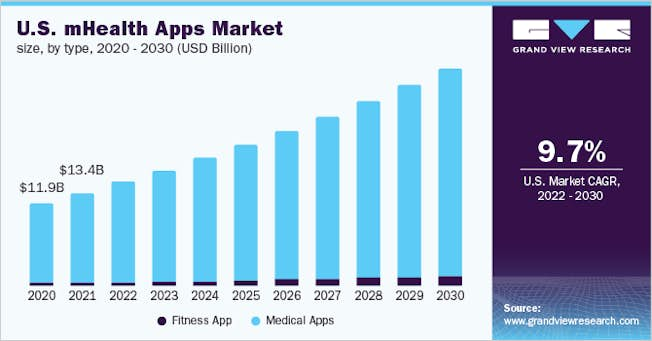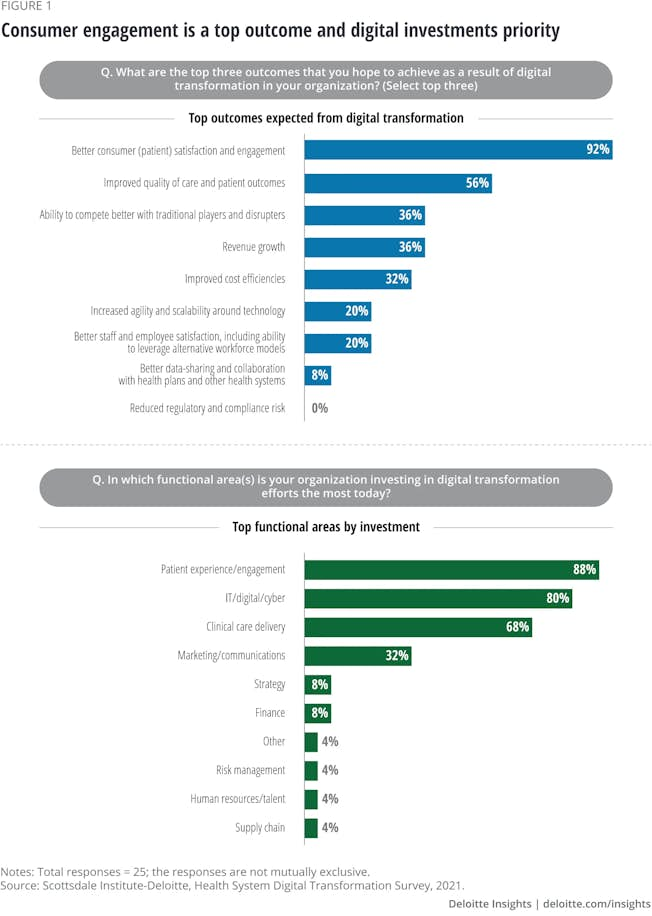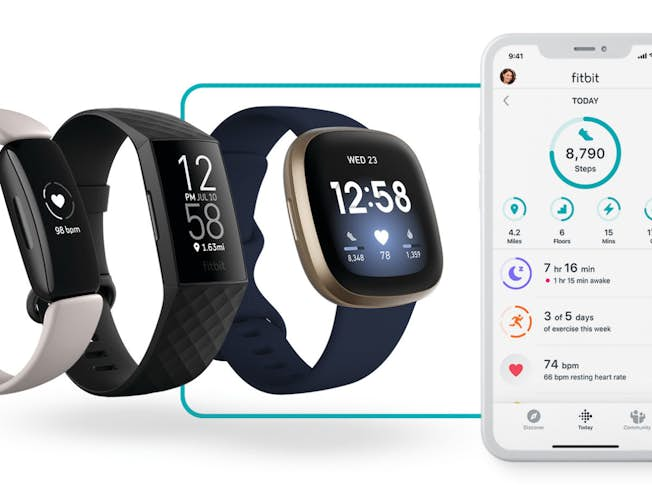Aug 10, 2022
What You Need To Know About Digital Transformation In Healthcare
Healthcare is one of the world’s most vital sectors. From frontline patient management and nursing to pharmaceuticals—every facet of healthcare needs to be efficient and forward-thinking and digital has had an impact on the way the industry operates and communicates.
The stakes are high in the healthcare industry as people are reliant on its success and regardless of which branch you work in, it’s vital to be adaptable and innovative in an ever-changing landscape.
To optimize their processes, services, and innovations, droves of leading businesses across sectors are investing in digital transformation, and medical providers are no exception.
Here we explore digital transformation and show why embracing the power of digital technologies and processes is so important in today’s hyper-connected age.
Why does digital transformation in healthcare matter?
Before the COVID-19 pandemic, the wheels of digital transformation were in motion—but turning slowly. Many medical institutions and pharmaceutical brands were lagging behind in the digital stakes, operating with outdated tools and processes.
The medical health mobile apps market exceeds $13.4 billion in the US alone and is predicted to keep growing into 2030. This value is a testament to the rising role of digital transformation in healthcare.

The rise of digital transformation in healthcare
The spread of COVID-19 has catalyzed digital transformation across every branch of pharma and healthcare, forcing medical institutions, brands, and providers to reimagine the way they operate.
In the UK, for example, the NHS invested in a digital overhaul of its public maternity services. This innovative leap towards digital transformation has significantly reduced the need for paperwork, saving the trust around 40 hours of staff administration time every year.
This new tech-centric initiative also gives maternity staff access to detailed patient analytics from a central digital dashboard while significantly improving the patient journey. With access to user-friendly apps and online tools, maternity patients can now access vital information instantly while gaining secure access to their medical records.
According to Deloitte, 92 percent of medical professionals and healthcare providers believe achieving a better patient experience is the top desired outcome for their digital transformation efforts while patient experience and engagement is the top area for investment for 88 percent of survey respondents.

In the pharmaceutical industry, brands are using autonomous technologies such as artificial intelligence (AI) and machine learning (ML) to gain a greater understanding of their audience. With access to smart tools and analytics, pharma brands are improving their product development processes while delivering personalized content that establishes authority and creates stronger consumer connections.
You can find out more about how a big pharma has managed its digital transformation journey by reading our Johnson & Johnson case study.
The importance of digital transformation in healthcare
Digital transformation is integral to the ongoing success of the healthcare industry. It can also help enhance customer experience, adhere to regulations and be ethically transparent. By digitizing key organizational functions and processes, you can:
- Optimize workflows and minimize administrative duties, improving efficiency while gaining the freedom to place your resources into initiatives that drive your organization or institution forward.
- Significantly improve patient care by gaining a panoramic view of essential data and insights that improve decision-making while facilitating personalization.
- Identify and prevent potential medical catastrophes from occurring, driving down unnecessary deaths and illnesses in the process.
- Improve financial efficiency by streaming operations across departments and eliminating unnecessary processes.
- Enhance medical product development and gain a deeper understanding of medical consumers to improve your healthcare sales and marketing initiatives (building trust and loyalty in the process).
In such a critical industry, brands and providers alike must embrace digital transformation to evolve. Migrating towards a digital future is essential, yet 60 percent of medical organizations feel that they’re only halfway through their digital transformation process.
Essential healthcare digital transformation trends
Digital transformation is changing the face of healthcare. From direct patient care to pharmaceutical sales and marketing, Heathcare Professionals (HCPs) across the industry are reaping the rewards of embracing a digital future. Here are some of the key trends that are driving positive change within the sector.
The rise of ‘on-demand’ healthcare or telehealth
Telehealth is the most attractive healthcare IT investment segment for healthcare providers in the next 12 to 24 months.
In the digital age, patients or consumers can access information from anywhere in the world and at any time.
By adapting to the needs of today’s digital natives and their increasingly demanding schedules, HCPs and medical brands are beginning to enhance the user journey with on-demand healthcare services.
According to a Digital Transformation in Healthcare in 2022 study, today’s medical consumers frequently go online to seek information such as:
- Researching doctors (47%)
- Looking at hospital and medical facilities (38%)
- Booking medical appointments (77%)
As digital transformation within healthcare continues to evolve, more HCPs will develop platforms, apps, and content hubs to provide access to personalized information, informative news or medical guides, and booking facilities that empower consumers to take charge of their healthcare needs in a way that suits their needs.
Big data and predictive analytics
To gain a deep-dive view of patient data and various organizational functions, an increasing number of HCPs are beginning to invest in big data analytics and data mining.
In addition to reducing human error and gaining a wealth of insights that can drive efficiency while providing a better patient or consumer experience across touchpoints, big data and analytics can uncover preventative trends or patterns.
Armed with cohesive visual data, medical providers and pharma brands can develop initiatives or strategies that can guide patients towards a safer, healthier future while preventing any budget-sapping events or issues before they unfold.
With access to patient and consumer data it’s also possible to provide an experience tailored to individual needs or pain points—which, in turn, cements trust, increases engagement, and inspires brand advocacy.
The continued popularity of wearables
As we mentioned earlier, the medical wearables market is thriving. With more people investing in wearables to monitor their health stats than ever before, HCPs and pharma brands alike have a key opportunity to tap into a highly-engaged market.
By providing patients or medical consumers with wearables such as heart rate monitors, sweatomitors or exercise trackers, you can gain a wealth of insight into your audience while gaining a direct line of communication. Conversely, medical brands can also tap into existing wearable markets and partner up with reputable brands (Garmin, FitBit, etc.) to deliver highly-targeted content to key audience segments.
Tapping into wearables means being able to incentivize consumers to engage with your brand while providing gamification opportunities and sharing valuable content that will showcase the value of your products or services.

FitBit’s Health Solutions Partnership Program, for instance, has proved successful with countless medical brands or organizations teaming up with the supplier to offer their consumers or patients wearables to monitor statistics and benefit from reward and recognition initiatives. A trend that is likely to continue in the coming years.
Digital marketing challenges in a highly-regulated industry
While digital transformation provides HCPs and pharmaceutical companies with a wealth of brand-boosting opportunities, there are certain roadblocks to overcome in a highly-regulated industry. Compliance to regulations is key and the customer journey needs to be at the heart of any strategy.
Wading through the informational red tape is one of the most inherent challenges in healthcare marketing. Understanding what you can or cannot say (or what you can or cannot promise) is paramount to remaining compliant and trustworthy. Navigating such stringent rules and regulations can prove restrictive, particularly in an age where consumers can access a wealth of medical information with the swipe of a screen or the click of a button.
But, by using data to your advantage, you can tap directly into the needs of key audience segments and deliver content that provides greater context or informational value than your competitors without disturbing any red tape.
Another marketing challenge for medical brands and providers is adopting a multichannel approach to their marketing strategies. 63 percent of pharma marketers believe that adopting a multichannel online and offline approach produces the best results.
But, with so many processes and functions to consider during the digital transformation process, achieving a multichannel marketing approach can be a slow process.
If you develop a comprehensive digital strategy from the start of your transformational journey, you will not only accelerate the process, but you will also achieve multichannel marketing outcomes that align with your specific organizational outcomes.
Explore: Our Digital Marketing Strategy Blueprint for the Pharma Industry will help to guide your strategy while our podcast ‘The Pulse of Healthcare Marketing’ can help you figure out how to communicate with customers and increase brand awareness.
Wrap up: Digital transformation in healthcare
Pharma brands and healthcare providers must evolve their field sales and marketing models to seize the opportunity to test bold new ways of thinking and working - such as driving B2B leads through LinkedIn. Virtual engagement is here to stay, requiring new ways of creating meaningful connections.
In the digital age, seeking new promotional models requires significant changes to pre-pandemic skills and processes. Understanding and planning for targeting customers in the digital age are pivotal to ongoing growth in the healthcare industry.
One of the most critical aspects of digital transformation in healthcare is your internal talent. By giving your staff the tools required to continually refine their digital skills, your institution or organization will remain adaptable in the face of constant change.
Become a Digital Leader in the Healthcare Sector
Empower your staff by giving them the knowledge and skills required to drive digital transformation. Work with DMI to offer tailored digital marketing and social selling training that fits the needs of your business and workforce. Download a corporate brochure today to find out more.
Related
Upgrade to Power Membership to continue
your access to thousands of articles, toolkits, podcasts, lessons and much much more.
Become a Power Member- Login
- View Courses
- - - -
- Courses
- Resources
- - - -
- My Account
- Change Password
- Logout





